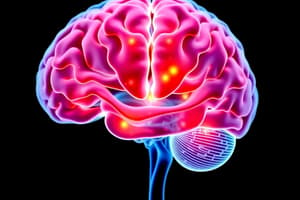Podcast
Questions and Answers
What was the predominant factor for short-term energy intake control according to the review of peripheral factors?
What was the predominant factor for short-term energy intake control according to the review of peripheral factors?
- Neurochemical factors
- Hormonal factors
- Metabolic factors
- Psychological factors (correct)
What type of theory is better supported according to the review of peripheral factors: short-term glucostatic type or long-term lipostatic type?
What type of theory is better supported according to the review of peripheral factors: short-term glucostatic type or long-term lipostatic type?
- Neither type is well supported
- Long-term lipostatic type theories (correct)
- Short-term glucostatic type theories
- Both types are equally supported
What was the neurological condition of RD, the 12-year-old boy who became rapidly obese?
What was the neurological condition of RD, the 12-year-old boy who became rapidly obese?
- Memory loss
- Blindness (correct)
- Epilepsy
- Paralysis
What is the typical outcome for children with craniopharyngioma after surgery to remove the tumor?
What is the typical outcome for children with craniopharyngioma after surgery to remove the tumor?
What is the association between permanent damage to the hypothalamus and weight regulation?
What is the association between permanent damage to the hypothalamus and weight regulation?
What was the inference drawn from cases like RD's regarding the role of the hypothalamus?
What was the inference drawn from cases like RD's regarding the role of the hypothalamus?
What was the consequence of affecting the 'satiety center' in RD's case?
What was the consequence of affecting the 'satiety center' in RD's case?
What is the primary focus of the boundary model proposed by Herman & Polivy?
What is the primary focus of the boundary model proposed by Herman & Polivy?
According to the boundary model, what happens if we starve ourselves or overeat?
According to the boundary model, what happens if we starve ourselves or overeat?
What is the average duration for which hunger strikers last?
What is the average duration for which hunger strikers last?
What is the historical significance of hunger striking as a form of social protest?
What is the historical significance of hunger striking as a form of social protest?
What does the boundary model extend to in the context of disordered eating?
What does the boundary model extend to in the context of disordered eating?
What may be more important than conscious control in short-term energy regulation?
What may be more important than conscious control in short-term energy regulation?
What is the primary aim of hunger strikers who voluntarily restrict intake to the point of death?
What is the primary aim of hunger strikers who voluntarily restrict intake to the point of death?
What does the text suggest about the ability of some people to diet and maintain weight in the long term?
What does the text suggest about the ability of some people to diet and maintain weight in the long term?
What is the biological perspective on short and long term control of energy intake, according to the text?
What is the biological perspective on short and long term control of energy intake, according to the text?
Which neurotransmitters inhibit eating when their levels are raised?
Which neurotransmitters inhibit eating when their levels are raised?
What selectively damages the hippocampus, according to years of animal and human data?
What selectively damages the hippocampus, according to years of animal and human data?
Which component is associated with reduced appetite and is a component of chylomicrons, indicating the nutrient density of food in the blood?
Which component is associated with reduced appetite and is a component of chylomicrons, indicating the nutrient density of food in the blood?
Which neurotransmitter induces satiation and satiety by reducing meal size, frequency, and eating rate?
Which neurotransmitter induces satiation and satiety by reducing meal size, frequency, and eating rate?
Which neuropeptide increases eating when present in the hypothalamus?
Which neuropeptide increases eating when present in the hypothalamus?
What is regulated by leptin and appears to alter the set point of body weight, potentially leading to anorexia or obesity when abnormal?
What is regulated by leptin and appears to alter the set point of body weight, potentially leading to anorexia or obesity when abnormal?
Which neurotransmitter affects eating by altering the function of cells in the Paraventricular nucleus of the Hypothalamus and is involved in the regulation of food intake?
Which neurotransmitter affects eating by altering the function of cells in the Paraventricular nucleus of the Hypothalamus and is involved in the regulation of food intake?
Which brain area emerged as a hunger center in the study of hypothalamic regulation of eating behavior?
Which brain area emerged as a hunger center in the study of hypothalamic regulation of eating behavior?
What did Stellar's theory propose about the Ventro Medial Hypothalamus (VMH) and the Lateral Hypothalamus (LH)?
What did Stellar's theory propose about the Ventro Medial Hypothalamus (VMH) and the Lateral Hypothalamus (LH)?
What challenge arose from early lesion techniques in studying hypothalamic regulation of eating behavior?
What challenge arose from early lesion techniques in studying hypothalamic regulation of eating behavior?
What did neuroimaging and neuropsychology studies reveal about feeding-related activities in the brain?
What did neuroimaging and neuropsychology studies reveal about feeding-related activities in the brain?
What did the case of HM, with dense anterograde amnesia, eating quickly and excessively despite intact hypothalamic and bodily appetitive control systems, suggest?
What did the case of HM, with dense anterograde amnesia, eating quickly and excessively despite intact hypothalamic and bodily appetitive control systems, suggest?
What does understanding the complex interplay between biological and cognitive factors in eating behavior contribute to?
What does understanding the complex interplay between biological and cognitive factors in eating behavior contribute to?
What did evidence from neuropsychological studies reveal about the impact of damage to brain areas such as the amygdala, orbitofrontal cortex, and frontal lobes?
What did evidence from neuropsychological studies reveal about the impact of damage to brain areas such as the amygdala, orbitofrontal cortex, and frontal lobes?
Flashcards are hidden until you start studying
Study Notes
Hypothalamic Regulation of Eating Behavior
- Hetherington & Ranson (1940) studied the effects of hypothalamic lesions on rat eating behavior, leading to the identification of the Ventro Medial Hypothalamus (VMH) as a satiety center.
- Lesions in the VMH induce hyperphagia, while electrical stimulation inhibits eating, supporting the VMH's role as a satiety center.
- The Lateral Hypothalamus (LH) emerged as a hunger center, as lesioning it caused rats to die of starvation, and stimulation induced eating.
- Stellar's theory proposed the VMH as a satiety center and the LH as a hunger center, both utilizing blood sugar level and body temperature to regulate ingestion.
- Evidence supporting the model of VMH and LH regulation raises questions about the specificity of the target behavior, the accuracy of lesion locations, and the involvement of other brain areas.
- Early lesion techniques were crude, leading to challenges in distinguishing site-specific damage from fibers of passage damage.
- Neuroimaging and neuropsychology studies reveal that feeding-related activities involve multiple brain areas beyond the hypothalamus, including the amygdala, insula cortex, orbitofrontal cortex, and others.
- Neuropsychological evidence shows that damage to brain areas such as the amygdala, orbitofrontal cortex, and frontal lobes can lead to unusual patterns of eating behavior.
- The case of HM, with dense anterograde amnesia, eating quickly and excessively despite intact hypothalamic and bodily appetitive control systems, raises questions about the cognitive control of eating.
- HM's case suggests that eating may be under greater cognitive control than previously believed, even when biological systems to regulate food intake are intact.
- These findings challenge the traditional understanding of eating behavior, indicating that it may be more cognitively influenced than previously thought.
- Understanding the complex interplay between biological and cognitive factors in eating behavior is crucial for advancing knowledge in this field.
Studying That Suits You
Use AI to generate personalized quizzes and flashcards to suit your learning preferences.




